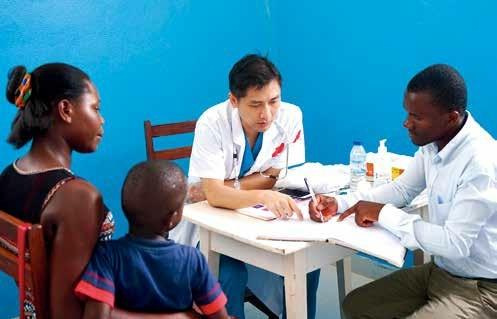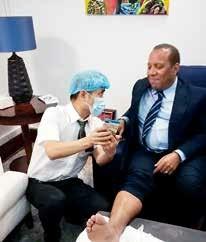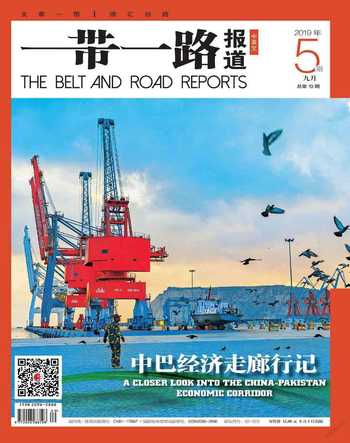擦亮医疗援外这块“金字招牌”
温韬
2018年2月3日,在成都飞往埃塞俄比亚的ET637航班上,一名乘客突然晕倒在后舱,脸色苍白,嘴唇发绀。情况万分紧急,幸好有一支中国医疗队在这次航班上。在队长李昂的带领下,经过近20分钟的紧急救治,患者症状缓解,转危为安。
这支医疗队是四川省第3批援圣多美和普林西比(以下简称“圣普”)的医疗队,这次万米高空上的营救是医疗队立的“首功”,为此次援外医疗工作开了个好头。
1年的援外工作,医疗队得到各方认可,作为队长的四川大学华西医院胰腺外科副主任李昂以无私大爱、医者仁心、精湛技术获得了“全国援外医疗工作先进个人”荣誉称号。
谈及荣誉,李昂表示这是对他工作的肯定,他说:“医疗援外是我国援外工作的一块‘金字招牌’,通过医疗援外,能在受援国建立良好的信誉。”
为了擦亮这块“金字招牌”,李昂在思想与业务上都做了充分准备。“援外任务下达到医院后,我主动递交了申请,因为我明白付出是人生快乐最大的源泉。另外,国家和党培养了我,在需要我去付出与回报的时候,我也应该去做这样一件有意义的事情。”
出发前,李昂认真学习了葡萄牙语以及当地的法律法规,也详细了解了当地的医疗条件与卫生状况,力求做到心中有数。然而,援外医疗工作在实际开展中仍然困难重重。
由于受援国经济相对落后,医疗条件差,整体的行业环境令人担忧。
“需要这份责任心,以治好病人为宗旨来做好医疗援外这份工作。同时,作为一名受过严格培训的医生,更要用自己的行动去影响当地更多的医生。”李昂是这么说的,也是这么做的。在援圣普期间,他带领队员们不畏艰苦、真抓实干,共接诊患者2588人次,义诊12次,为中国医疗援助在圣普开辟了阵地;协助四川省卫生健康委员会推进“三年对口医院援建项目”——腹腔镜技术援助项目,拟定了该项目的计划书和腹腔镜器械捐赠目录,为高技术医疗服务贴上了中国援助的标签;协助推进外交部捐赠圣普“移动诊疗车”项目,李昂负责拟定该项目医疗设备与车辆配置的参数,保障了援外医疗工作的纵深发展。
圣普总人口约20万,当地外科医疗水平十分有限,而中国医疗队的到来,正在慢慢改善这一局面。
2018年7月的一天,一名“肚子已挺出足球大小包块”的患者来到圣普国家医院求医,这让当地医生犯了难。他们担心肿瘤情况复杂,开腹手术难度太大。
李昂知晓情况后,对患者进行了诊断,判断肿瘤极有可能是胃肠道间质瘤。他建议,尽快采取手术为患者争得生机。
7月11日,由李昂“操刀”,在圣普国家医院开展了当地首例巨大胃间质瘤切除术。术中证实,该肿瘤正是生长于胃外壁,具有包膜,符合胃间质瘤的临床诊断特征。在当地医生的配合下,李昂顺利切除了直径达20cm的肿瘤,患者术后没有出现并发症,恢复良好。

术后,李昂还为当地医生讲解了胃肠道间质瘤的诊疗标准等知识……援外期间,李昂先后开展手术300多台,获得了当地医生与患者的一致赞扬。
除为当地老百姓治疗外,李昂还为该国前总理特罗瓦达成功实施了足底封闭术,缓解了他足底筋膜炎导致行走困难的问题。
那是2018年4月的一天,李昂接到了特罗瓦达的“求助”。原来,特罗瓦达受足底筋膜炎影响已一个多月,严重到难以行走,彼时又刚好需要出访,时间紧迫。
李昂前往其官邸进行诊断后,立即与国内华西医院疼痛科专家杨邦祥教授取得联系,并制定了诊疗方案,在特罗瓦达出访临行前为他做了封闭治疗。术中,还通过手机软件准备了3D的解剖图形,讲解疾病区域的解剖结构,让特罗瓦达在治疗中保持放松。
“做完治疗是下午5点,特罗瓦达的航班是晚上8点。治疗结束后,他马上就可以下地行走,整个出访期间也没有复发,治疗效果很理想。”李昂后来了解到。
对李昂及其团队来说,如何提高圣普医务工作者的医疗水平是此次援助工作的重中之重。
“外科手术无菌操作是最基本的,但当地医护人员普遍缺乏这样的观念。”李昂明白,提倡无菌操作要注意方式方法,还应维护当地医务工作者的自尊心。
援外期间,李昂为当地医生针对常见病诊疗指南的培训近20次,推动了当地临床医疗的规范化和标准化,当地医务工作者的业务水平得到显著提升。
除了工作上面临诸多困难,需要不断寻求突破外,医疗队在生活中也会遭受停水停电及“巨大昆虫”的困扰,好在队员们善于自我调节。
在医疗队驻地,一棵芒果树就能给医疗队带来极大的乐趣。那是一棵没人管理的果树,到了成熟期,每天都会掉落很多新鲜的果子,大家捡起来擦一擦就能吃。“特别开心,这里的菠萝蜜也好吃,队员们都爱吃。”回想起在圣普的时光,李昂面带笑意。
2018年8月6日,是李昂39岁生日,医疗队的翻译莫鹏弹起了尤克里里,为他送上生日祝福。“和我在成都的街头走一走,直到所有的灯都熄灭了,也不停留……”一曲《成都》让李昂眼眶微红。
情洒非洲,心盼故乡。为期一年的医疗援助已于2019年2月结束,医疗队也返回国内。回忆在圣普与队友“并肩作战”的日子,李昂说,“这是对我的考验,是我职业生涯的催化剂,也是人生中一笔宝贵财富。”
On the flight ET637 from Chengdu to Ethiopia on February 3, 2018, a passenger suddenly fainted in the cabin. He was looking pale and his lips were turning bluish. Fortunately, there was a Chinese medical team on board in the urgent situation. After nearly 20 minutes of emergency treatment administered by the team led by Li Ang, the passenger was out of danger.
As the third batch of medical team sent by Sichuan Province to assist Sao Tome and Principe (STP), this team“won the first battle” at the rescue, starting the foreign medical aid work on a good note.

Outstanding achievements were garnered in the medical aid work in STP over the past year. As the team leader, Li Ang, deputy director of the Department of Pancreatic Surgery of West China Hospital, Sichuan University, won the honorary title of “model individual of China’s foreign medical aid work” by right of his selfless love and benevolence for patients and superb skills.
When talking about honor, Li regarded it as a recognition of his work. He said, “Medical aid, serving as a ‘goldlettered signboard’ of China’s foreign aid work, can earn a good reputation for China from the recipient countries.”
To brighten the gold-lettered signboard, Li was fully prepared both mentally and professionally. “As soon as my hospital received the foreign aid assignment, I submitted my application voluntarily, because I believe that in our life, happiness comes from giving. Moreover, it is China and the Party that has cultivated me and I should do something meaningful when I am required to give and return.”
Before setting out, Li earnestly studied Portuguese and local laws and regulations of STP, and gained detailed understanding of local medical and sanitary conditions. Although he made every effort to prepare, there was still a hardship in actual practice.
Thwarted by relatively backward economy and poor medical conditions, the recipient country suffered from a worrisome industry environment.
“We view the cure of patients as our own responsibility to delivery medical aid work. And as a doctor who has received strict training, I need to spur more local doctors with my own behavior,” Li said.
That’s what Li said and did. Under his leadership during in STP, the team worked hard and made solid efforts. They received 2,588 medical cases and provided 12 free medical treatments in total, which broke new grounds for China’s medical aid undertaking in STP; they also helped the Health Commission of Sichuan Province promote its threeyear project of counterpart hospital assistance – Laparoscopic Technical Assistance Project, drafted the project plan and the donation list of laparoscopic instruments, which labeled high-tech medical services as China’s aid work; in addition, they also assisted in advancing the project of donating “Mobile Medical Vehicles” to STP, which was proposed by the Ministry of Foreign Affairs of PRC, and drew up the parameters of medical equipment and vehicle configuration of the project, by which they boosted the indepth development of China’s medical aid work to foreign countries.
The arrival of Chinese medical teams has slowly improved the limited surgical level of STP, which has a population of about 200,000.
One day in July 2018, a patient“with a tumor the size of a football in his stomach” came to STP National Hospital, putting local doctors in a quandary. They were unable to do any operation given the complexity of the tumor and the difficulty of laparotomy.
Having known the situation, Li diagnosed the patient and asserted that his tumor was most likely the gastrointestinal stromal tumor. He suggested a surgery as soon as possible to save the patient’s life.
On July 11, Li personally carried out the first local giant gastric stromal tumor resection in STP National Hospital. Intraoperatively, it was confirmed that the tumor grew in the outer wall of the stomach and had an envelope, which was in line with the clinical diagnostic features of gastric stromal tumor. With the cooperation of local doctors, Li successfully removed the tumor with a diameter of up to 20cm. The patient had no complications after the surgery and recovered well.
After the surgery, Li also explained the diagnosis and treatment criteria of gastrointestinal stromal tumors for local doctors. With over 300 surgeries carried out during the foreign aid in STP, Li has earned himself the praise from both local doctors and patients.
In addition to treating locals in STP, Li also successfully implemented a plantar fasciitis surgery for the country’s former Prime Minister Patrice Trovoada to alleviate his pain in walking.
One day in April 2018, Li received a message from Trovoada for help. Severe plantar fasciitis over more than a month made Trovoada hard to walk. And he was time-starved for the treatment as a state visit was on the schedule.
Li, after diagnosing Trovoada in his official residence, immediately contacted professor Yang Bangxiang, expert in the Department of Pain Treatment at West China Hospital, and developed a treatment scheme to be operated on him before the visit. During the surgery, 3D anatomical drawings were displayed through mobile phone software to explain the anatomy of the disease for Trovoada and keep him relaxed.
“The treatment was done at 5 p.m. and Trovoada’s flight was at 8 p.m. He could walk on the ground immediately after the surgery, and there was no recurrence during his visit. The therapeutic effect was satisfactory,” Li later learned.
For Li and his team, how to improve the medical skills of local medical workers in STP was a top priority.
“Aseptic technique is the most basic requirement during surgical operations to keep patients safe from infection. But there is a general lack of such awareness among local healthcare workers.” Li understood that it is necessary to take right approaches that can protect the self-esteem of local medical workers while promoting aseptic technique.
By far Li has conducted trainings for local doctors on common disease diagnosis and treatment for about 20 times, which has driven the standardization of local clinical treatment and significantly improved the performance of local medical workers.
Apart from many difficulties at work that required them constantly reinvent themselves, Li and his team also suffered from water and power outages and “giant insects” in life. Fortunately, all team members are very self-regulating.
A mango tree in the area where the medical team was stationed can bring great joy to them. It was an unmanaged fruit tree. Fruits would fall off when it was getting ripe and they would pick up and eat. “I really enjoy it and the jackfruit here is delicious too. We all love it.” Recalling the time in STP, Li smiled.
On Li’s 39th birthday on August 6, 2018, the team’s interpreter Mo Peng played ukulele to send him a birthday blessing. “In the Chengdu streets we wander and wander, until all the lights go out but we still linger,” lyrics of Chengdu, a folk song recorded by the musician Zhao Lei, touched his heart.
They worked with might and main in Africa to soothe their homesick heart. The one-year medical aid work ended in February 2019 and the medical team returned home. As he recalled the extraordinary journey he had taken with his teammates in STP, Li said, “It is definitely a test for me, a valuable asset in my life, and also a catalyst for my career.”

